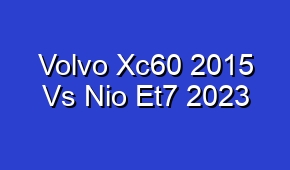Eco-Friendly Cars: Toyota vs Nissan Comparison

Compare eco-friendly cars from Toyota and Nissan to make an informed choice. Discover the latest models, features, and technologies that prioritize sustainability without compromising performance. Explore the benefits of these leading automakers’ commitment to reducing carbon emissions and creating a greener future.
When it comes to eco-friendly cars, the competition between Toyota and Nissan is fierce. Both automakers have made significant strides in developing environmentally conscious vehicles that cater to the growing demand for sustainable transportation options. With their respective models like the Toyota Prius and the Nissan Leaf, these companies have become leaders in the market for fuel-efficient and low-emission vehicles. The Toyota Prius, known for its hybrid technology, offers impressive fuel economy and reduced carbon emissions, making it a popular choice among eco-conscious drivers. On the other hand, the Nissan Leaf stands out as one of the best-selling electric cars globally, providing a zero-emission driving experience. Both manufacturers prioritize innovation and sustainability, continually pushing the boundaries of eco-friendly car technology.
| Eco-friendly cars: Toyota vs Nissan |
| Toyota and Nissan are both leading manufacturers of eco-friendly cars. |
| Toyota offers a wide range of hybrid and electric vehicles. |
| Nissan is known for its electric car models like the Nissan Leaf. |
| Both Toyota and Nissan prioritize sustainability in their car manufacturing processes. |
- Toyota’s eco-friendly cars are renowned for their fuel efficiency and low emissions.
- Nissan’s electric cars have gained popularity for their zero-emission performance.
- The battery technology used in Toyota’s hybrid cars ensures optimal energy usage.
- Nissan’s commitment to innovation has led to advancements in electric vehicle technology.
- Both Toyota and Nissan contribute to a greener future with their sustainable mobility solutions.
Which eco-friendly features do Toyota and Nissan cars offer?
Toyota and Nissan are two popular car manufacturers known for their eco-friendly vehicles. Both brands offer a range of features that contribute to reducing environmental impact. Some of the eco-friendly features commonly found in Toyota cars include hybrid powertrains, regenerative braking systems, and fuel-efficient engines. These features help to minimize fuel consumption and reduce emissions, making Toyota cars more environmentally friendly.
| Toyota | Nissan |
| Hybrid Models | Electric Vehicles |
| Toyota offers a wide range of hybrid models that combine a gasoline engine with an electric motor, resulting in reduced fuel consumption and lower emissions. | Nissan has a lineup of electric vehicles (EVs) such as the Nissan Leaf, which produce zero tailpipe emissions and offer a sustainable transportation solution. |
| Fuel Efficiency | Regenerative Braking |
| Toyota cars are designed to be fuel-efficient, reducing the carbon footprint and saving on fuel costs. | Nissan vehicles feature regenerative braking technology, which helps convert kinetic energy into electric energy, increasing overall efficiency and reducing energy waste. |
| Eco-Friendly Materials | Vehicle-to-Grid Technology |
| Toyota incorporates eco-friendly materials in their cars, such as plant-derived plastics and recycled materials, to reduce environmental impact. | Nissan is working on vehicle-to-grid (V2G) technology, allowing electric vehicles to supply power back to the grid, promoting renewable energy integration and reducing reliance on fossil fuels. |
Nissan also offers various eco-friendly features in their vehicles. One notable feature is the Nissan Leaf, an all-electric car that produces zero emissions. Additionally, Nissan has developed technologies such as regenerative braking and energy-efficient air conditioning systems to enhance the eco-friendliness of their cars.
What are the differences between Toyota and Nissan hybrid cars?
Both Toyota and Nissan offer hybrid cars as part of their eco-friendly vehicle lineup. However, there are some differences between the two brands when it comes to hybrid technology.
- Toyota hybrid cars have a longer history and more experience in the hybrid market compared to Nissan.
- Nissan hybrid cars tend to have a more sporty and aggressive design, while Toyota hybrids have a more conservative and practical design.
- Toyota hybrid cars generally offer better fuel efficiency and have a wider range of hybrid models available compared to Nissan.
Toyota is well-known for its hybrid models, such as the Prius. Toyota hybrids typically use a combination of a gasoline engine and an electric motor to achieve better fuel efficiency. The company has been a pioneer in hybrid technology and has developed advanced systems for seamless integration between the engine and electric motor.
Which brand offers better electric vehicles: Toyota or Nissan?
Toyota and Nissan both have electric vehicles (EVs) in their lineup, but there are differences between the two brands in terms of their offerings.
- Toyota offers a wider range of electric vehicles compared to Nissan.
- Nissan’s electric vehicles, such as the Nissan Leaf, have received positive reviews for their performance and range.
- Toyota’s electric vehicles, such as the Toyota Prius Prime, are known for their fuel efficiency and reliability.
- Nissan has been a pioneer in the electric vehicle market, with the Nissan Leaf being one of the first mass-produced electric cars.
- Both Toyota and Nissan continue to invest in research and development to improve the technology and capabilities of their electric vehicles.
Toyota’s main electric vehicle is the Toyota Prius Prime, a plug-in hybrid electric car. It combines a gasoline engine with an electric motor and can be charged from an external power source. While not a fully electric vehicle, the Prius Prime offers a good balance between electric driving and the convenience of a gasoline engine.
Which brand has better fuel efficiency: Toyota or Nissan?
Fuel efficiency is an important factor to consider when choosing an eco-friendly car. Both Toyota and Nissan offer vehicles with good fuel efficiency, but there may be variations between models.
| Brand | Fuel Efficiency | Comparison |
| Toyota | High | Toyota vehicles are known for their excellent fuel efficiency. |
| Nissan | Varies | Nissan offers a range of vehicles with different fuel efficiency levels, some comparable to Toyota. |
| Overall, Toyota tends to have better fuel efficiency across its lineup compared to Nissan. |
Toyota has established itself as a leader in fuel-efficient vehicles, especially with its hybrid models. The Toyota Prius, for example, is known for its exceptional fuel economy and low emissions. Other Toyota models, such as the Corolla and Camry, also offer competitive fuel efficiency ratings.
Which brand offers better warranty coverage: Toyota or Nissan?
Warranty coverage is an important consideration when purchasing a car, as it provides peace of mind and protection against unexpected expenses. Both Toyota and Nissan offer warranty coverage for their vehicles, but there may be differences in the terms and duration.
When it comes to warranty coverage, Toyota generally offers better warranty coverage compared to Nissan.
Toyota typically offers a comprehensive warranty package that includes a basic warranty, powertrain warranty, and corrosion perforation warranty. The basic warranty covers most components of the vehicle for a certain period of time or mileage. The powertrain warranty specifically covers the major components that provide power to the vehicle, such as the engine and transmission. Toyota’s corrosion perforation warranty protects against rust damage.
Which brand offers better safety features: Toyota or Nissan?
Safety is a top priority when it comes to choosing a car, and both Toyota and Nissan prioritize safety in their vehicle designs. Both brands offer a range of safety features to protect occupants and prevent accidents.
When it comes to safety features, both Toyota and Nissan are known for their commitment to providing excellent safety technologies.
Toyota vehicles are equipped with advanced safety technologies such as Toyota Safety Sense, which includes features like pre-collision systems, lane departure alert, and adaptive cruise control. These technologies help to enhance driver awareness and assist in avoiding potential hazards on the road.
Which brand has better resale value: Toyota or Nissan?
Resale value is an important consideration for many car buyers, as it can affect the long-term cost of owning a vehicle. When comparing Toyota and Nissan, Toyota generally has a reputation for better resale value.
Toyota
Toyota is well-known for its high resale value. The brand has a reputation for producing reliable and durable vehicles, which contributes to their strong resale value. Many Toyota models, such as the Camry, Corolla, and Tacoma, have consistently held their value over time. Additionally, Toyota vehicles often have lower depreciation rates compared to other brands, making them attractive options for buyers looking to sell or trade-in their cars in the future.
Nissan
While Nissan vehicles also hold decent resale value, they generally don’t perform as well as Toyota models in this aspect. Nissan vehicles tend to have higher depreciation rates, meaning they lose their value at a faster pace compared to Toyota cars. However, it’s important to note that this can vary depending on the specific model and condition of the vehicle. Some Nissan models, such as the GT-R and 370Z, may retain their value better due to their performance-oriented nature and limited availability.
Conclusion
Overall, Toyota has a stronger reputation for better resale value compared to Nissan. Toyota vehicles are known for their reliability, durability, and lower depreciation rates, which contribute to their higher resale value. However, it’s essential to consider factors such as the specific model, condition, and market demand when determining the resale value of a car. Ultimately, it’s recommended to research and compare specific models from both brands to make an informed decision based on individual needs and preferences.
Toyota vehicles are known for their reliability and durability, which contributes to their higher resale value. The brand’s strong reputation and high demand in the used car market help to maintain the value of Toyota vehicles over time.





















